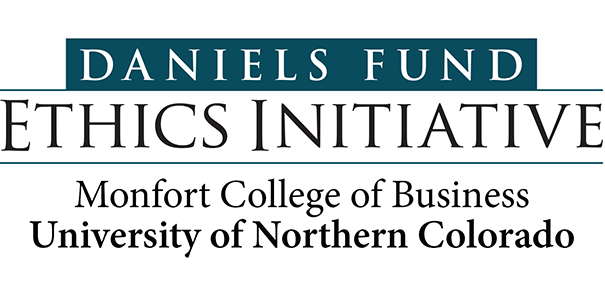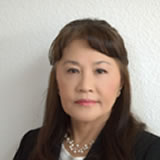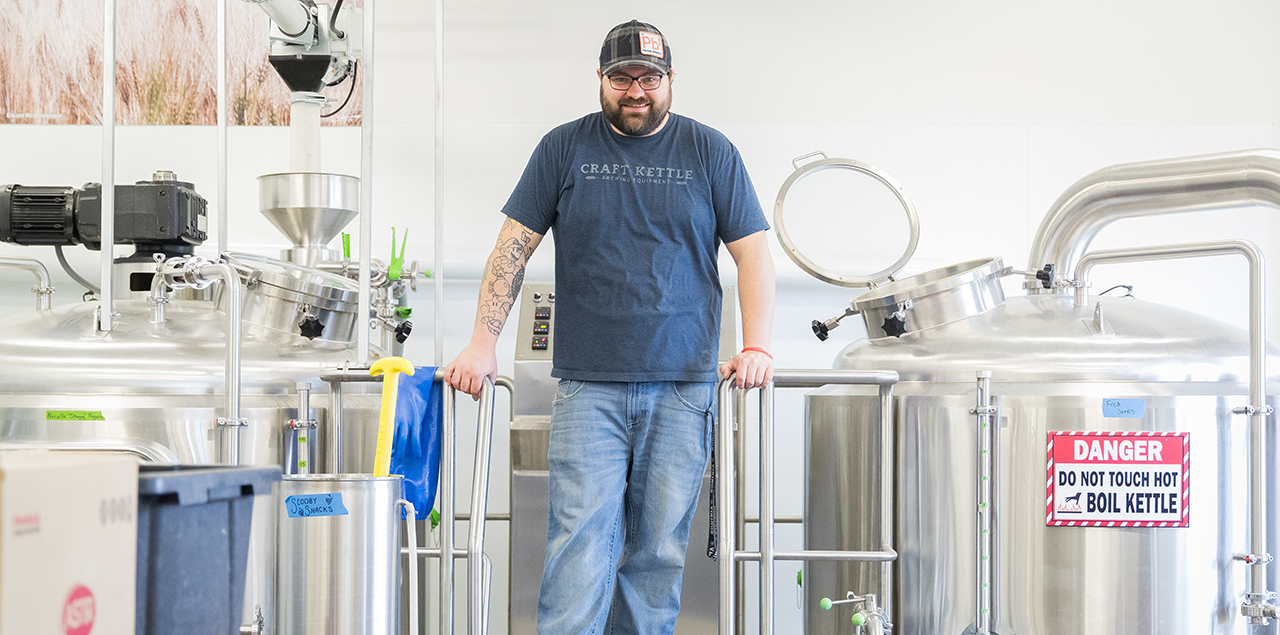
On Friday, April 16, four undergraduate students from the University of Northern Colorado’s (UNC) Monfort College of Business earned first place honors at the Daniels Fund Ethics Initiative’s ninth annual Collegiate Program Case Competition. This is the fourth time a team from UNC has placed in the event, winning first place in 2016 and 2017 and third place in 2015.
Students who represented UNC in the undergraduate track during the competition were: Jamal Blassingale, Business Administration, emphasis in Marketing; Halaki Gionet, Business Administration, emphasis in Marketing and Finance; Davis Johnson, Business Administration, emphasis in Management, and Theater Arts; and Emmy Scott, Business Administration, emphasis in Management, and Environmental and Sustainability Studies.
Graduate students in the Master of Business Administration program also competed: Andy Dus, Sarah Otto, Holly Haslam, Stephen Harries and Mike Morrow.
“Participating in this competition was an incredible experience for every member of our team. Applying the knowledge that we had learned to the case, doing further research and presenting our solutions to the judges deepened our understanding of what it means to run an ethical business,” Johnson, the team leader, wrote. “As a team, we never settled. We gave it our absolute best, and this experience inspired us to continue to do better and stride with integrity. We are sincerely appreciative for all who contributed to our success.”
This competition exposes students to a thought-provoking business ethics case and is designed to challenge students’ ethical reasoning, give them tools for ethical decision-making and raise awareness of the importance of principle-based ethics.
The event included two separate competition tracks — one for undergraduate students and another for graduate students. For the first time ever, the competition was held in a live virtual format, due to COVID-19 considerations, with students participating from across Colorado, New Mexico, Utah and Wyoming.
 “I am inspired by their ability and commitment to do such excellent work,” Keiko Krahnke, Ph.D., a professor at Management at UNC and director of The Daniels Fund Ethics Initiative
Collegiate Program, wrote. “These are students who have many other responsibilities
outside of their classes … they must have been exhausted some days and nights, but
they showed their grit to keep going and determination to succeed. The team said to
me, ‘Even if we don’t place, we want to be able to say that we gave it our very best.’”
“I am inspired by their ability and commitment to do such excellent work,” Keiko Krahnke, Ph.D., a professor at Management at UNC and director of The Daniels Fund Ethics Initiative
Collegiate Program, wrote. “These are students who have many other responsibilities
outside of their classes … they must have been exhausted some days and nights, but
they showed their grit to keep going and determination to succeed. The team said to
me, ‘Even if we don’t place, we want to be able to say that we gave it our very best.’”
In advance of the competition, teams were provided with a business ethics case involving a fictional defense industry technology company, specializing in artificial intelligence and biological experiments. Students take on the role of an ethics consulting firm hired by the company’s board of directors to help deal with ethical issues and risks at the company.
This year, 11 undergraduate and 11 graduate student teams participated in the competition. Each team analyzed the ethical issues involved and presented their prepared recommendations to a panel of judges. After their presentation, the teams received new information — a twist on the case that introduced a crisis. They had just four hours to re-analyze their original recommendations and make a second presentation to the judges incorporating the new information.
Placing second in the undergraduate track was University of Utah’s David Eccles School of Business and the third-place team was from the University of Wyoming’s College of Business.
In the graduate competition, students from Colorado State University’s College of Business placed first, followed by University of Utah’s David Eccles School of Business placing second and University of Colorado Denver’s Business School placing third.
Panels of judges for each track were comprised of business and community leaders who played the role of the company’s board of directors. Jandel Allen-Davis, CEO and president of Craig Hospital, served as head judge for the graduate track, and Mark Cordova, founder and president of Centennial Bolt, served as head judge for the undergraduate track.
The panels of judges included: Albus Brooks, vice president of business development and public affairs at Milender White; Ted Harms, executive director of the Anschutz Foundation; Richard Martinez, president and CEO of Young Americans Center for Financial Education and Young Americans Bank; Christopher Picardi, senior vice president of KeyBank; Mary Rhinehart, chairman of Johns Mansville; Mike Talamantes, managing director at RBC Capital Markets; and Robin Wise, president and CEO of Junior Achievement – Rocky Mountain.
Judges evaluated presentations against established criteria, including the Daniels Fund Ethics Initiative Principles: integrity, trust, accountability, transparency, fairness, respect, rule of law and viability.
About the Daniels Fund Ethics Initiative Collegiate Program
Reflecting Bill Daniels’ personal commitment to ethics and integrity, the Daniels Fund Ethics Initiative Collegiate Program was established in 2010 to instill a high standard of ethics in students and strengthen principle-based ethics education in participating schools. The current phase of the program consists of 12 business and law school university partners in Colorado, New Mexico, Utah and Wyoming. To date, more than 450,000 students, faculty and businesspeople have been impacted by the Collegiate Program.
About the Daniels Fund
The Daniels Fund, established by cable television pioneer Bill Daniels, is a private charitable foundation dedicated to making life better for the people of Colorado, New Mexico, Utah and Wyoming through its grants program, scholarship program and ethics initiative.
More Stories
-
MCB Students Gain Pathway to Career-Ready Resources
Este artículo no está en español.
-
Launching a Career at the Start
Empezando una carrera como emprendedor
-
Cheers! Brewing Program Taps into Local Partnership to Sell Beer
Este artículo no está en español.
-
NSF Grant to Focus on Entrepreneurship, Workforce Resilience and Development along Colorado's Front Range
Este artículo no está en español.





